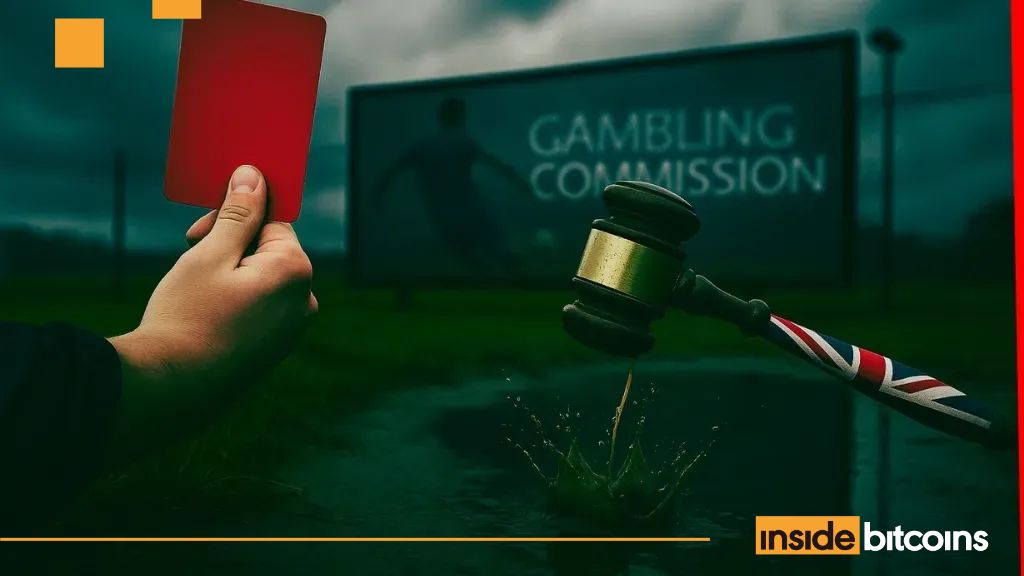Join Our Telegram channel to stay up to date on breaking news coverage
The UK Gambling Commission (UKGC) has compelled TGP Europe, a major white-label gambling operator, to exit the British market following a £3.3 million penalty for systemic compliance failures. This decisive regulatory action, announced in May 2025, has thrown several high-profile Premier League football sponsorships into disarray and signals an intensified crackdown on white-label operations in British sports betting.
TGP Europe’s departure from the UK market comes after regulators identified serious anti-money laundering (AML) deficiencies and due diligence lapses across its network of 29 gambling websites. The enforcement marks one of the UKGC’s most significant actions against a white-label provider and carries major implications for the future of gambling sponsorships in UK sports.
Key Takeaways
- Substantial Penalty: TGP Europe has been fined £3.3 million and forced to surrender its UK gambling license following extensive compliance failures.
- Repeat Offender: This marks TGP’s second major penalty, following a £316,250 fine in 2023 for similar AML and due diligence violations.
- Premier League Impact: Five Premier League clubs with TGP-affiliated sponsors – AFC Bournemouth, Fulham FC, Newcastle United, Wolverhampton Wanderers, and Burnley FC—face immediate sponsorship disruption.
- Legal Warnings: The UKGC has warned clubs they may face prosecution unless they prove effective geo-blocking and demonstrate due diligence compliance.
- White-Label Scrutiny: The action represents a broader regulatory crackdown on the white-label business model that allows unlicensed brands to operate under another company’s license.
- Government Review: The UK government is reviewing white-label sponsorship models, with potential additional reforms forthcoming.
- Consumer Risk: Players with accounts on TGP-affiliated sites are advised to withdraw funds promptly as consumer protections no longer apply.
Investigation Findings: Systematic Compliance Failures
The UKGC’s investigation into TGP Europe uncovered widespread and serious violations across its operations. As a white-label provider, TGP allowed numerous gambling brands to operate under its license without adequate oversight, creating substantial regulatory blind spots.
Inadequate Due Diligence
Investigators found that TGP Europe consistently failed to conduct proper vetting of its business partners and customers:
- The company did not adequately verify the source of funds for business arrangements with third-party entities.
- Background checks on white-label partners were superficial and incomplete.
- Corporate structures of partner organizations were not properly scrutinized, allowing potentially unsuitable operators to access the UK market.
“These failures represent a fundamental breakdown in TGP’s gatekeeper responsibilities,” stated the UKGC in its enforcement notice. “As a license holder, TGP was obligated to ensure all entities operating under its authority met the same high standards required of direct licensees.”
Anti-Money Laundering Breaches
Perhaps most concerning were TGP’s systematic failures to implement required anti-money laundering protocols:
- The operator repeatedly ignored red flags indicating potential money laundering activity.
- Enhanced due diligence measures were not implemented for high-risk customers and transactions.
- Transaction monitoring systems were inadequate to identify suspicious patterns of behavior.
- Staff training on AML compliance was insufficient and outdated.
These violations were particularly troubling given TGP’s previous penalty in 2023 for similar failings, suggesting the company had not meaningfully addressed earlier compliance issues despite regulatory warnings.
Oversight of Illegal Activities
The investigation also revealed that TGP failed to assess whether its third-party partners were engaged in illegal activities:
- No substantive checks were conducted to verify the legal status of partner operations in territories outside the UK.
- Reports of potential illegal online fiat and crypto gambling activities were not properly investigated.
- The company lacked procedures to identify and terminate relationships with partners engaging in unlawful activities.
“The combination of these failures created an environment where TGP effectively abdicated its regulatory responsibilities,” noted John Pierce, UKGC Head of Enforcement. “Our licensing regime depends on operators serving as responsible gatekeepers, and TGP’s approach fell dramatically short of this requirement.”
Impact on Premier League Football Sponsorships
The immediate consequence of TGP Europe’s market exit is the invalidation of its UK gambling license, rendering all white-label partnerships operating under that license unlawful. This has created a crisis for five Premier League clubs with TGP-affiliated sponsors:
Affected Clubs and Sponsors
- AFC Bournemouth: Sponsored by BJ88, a TGP white-label brand focused on the Asian betting market.
- Fulham FC: Partnered with SBOTOP, which operated in the UK market under TGP’s license.
- Newcastle United: Backed by two affected sponsors – Sportsbet.io and Fun88 – both utilizing TGP’s regulatory umbrella.
- Wolverhampton Wanderers: Associated with Debet, another TGP-affiliated operator.
- Burnley FC: Sponsored by 96.com, which leveraged TGP’s licensing arrangement.
These partnerships, collectively worth an estimated £50 million annually in sponsorship revenue, now face an uncertain future as the associated betting brands can no longer legally operate in the UK market.
Regulatory Warnings to Clubs
The UKGC has taken the unusual step of directly warning the affected football clubs about potential legal consequences, stating they may face prosecution unless they can demonstrate:
- Effective Geo-Blocking: Proof that UK consumers cannot access the now-unlicensed gambling sites, even through VPN services or other technological workarounds.
- Due Diligence Compliance: Evidence that clubs conducted thorough vetting of TGP and its affiliated brands before entering sponsorship agreements.
John Pierce delivered an unambiguous message to the clubs: “Football clubs must take responsibility for protecting their fans from exposure to unlicensed gambling operators. We will be conducting unannounced compliance checks to ensure these sponsorships do not provide backdoor access to the UK market, and failure to comply could result in substantial fines or even imprisonment for responsible officials.”
Commercial and Reputational Fallout
The commercial implications for the affected clubs extend beyond the immediate loss of sponsorship revenue:
- Mid-season kit changes may be required to remove now-illegal gambling brands
- Marketing materials and stadium advertising must be rapidly revised
- Commercial teams face the challenge of securing replacement sponsors in a compressed timeframe
- Club reputations may suffer from association with penalized gambling operators
“This situation creates a perfect storm of commercial disruption,” explained sports marketing consultant Victoria Harrington. “Clubs are facing not just financial losses but significant logistical challenges and potential reputational damage. Finding replacement sponsors of similar value mid-season is exceptionally difficult, particularly given the increased scrutiny on gambling partnerships.”
Broader Regulatory Context and Industry Implications
TGP Europe’s forced exit represents more than just action against a single operator – it signals a fundamental shift in the UKGC’s approach to white-label operations and gambling sponsorships in sport.
Crackdown on White-Label Operations
The white-label business model, which allows brands without their own gambling licenses to operate under another company’s regulatory approval, has long raised concerns among gambling authorities. This arrangement can create accountability gaps and regulatory blind spots.
“What we’re seeing is the beginning of a systemic evaluation of the white-label model,” noted gambling regulation expert Dr. Michael Thomson. “The fundamental question is whether these arrangements are compatible with the high standards of compliance expected in the UK market, particularly given the potential for money laundering and other financial crimes.”
TGP’s case is not isolated. The action follows similar enforcement against BC.Game in 2024, which left Leicester City without a sponsor amid bankruptcy rumors, suggesting a broader regulatory focus on these arrangements.
Government and Legislative Response
The UK government has signaled that further action may be forthcoming. Gambling Minister Baroness Twycross has pledged to review white-label sponsorship models as part of the government’s ongoing gambling reform agenda.
“We are closely monitoring the situation and will not hesitate to take further action if necessary to ensure the integrity of British gambling and sports sponsorship,” Baroness Twycross stated. “The protection of vulnerable individuals and the prevention of gambling-related harm remain our highest priorities.”
Industry analysts expect this could lead to:
- New legislation specifically addressing white-label arrangements
- Enhanced sponsor vetting requirements for sports organizations
- Stricter penalties for clubs that partner with non-compliant gambling operators
- Potentially complete prohibition of certain sponsorship structures
Impact on Licensed Operators
The UKGC’s action sends a clear message to all gambling operators in the UK market:
“This enforcement should serve as a wake-up call to the entire industry,” stated Pierce. “Licensed operators must audit their partnerships, ensure robust AML and social responsibility compliance, and recognize that regulatory requirements are non-negotiable.”
For legitimate operators, this crackdown may actually present opportunities:
- Reduced competition from non-compliant operators
- Potential to acquire customers from exiting brands
- Opportunities to develop sponsorship relationships with affected clubs
- Enhanced reputation for operators demonstrating exemplary compliance
However, these operators will also face heightened scrutiny of their own compliance systems and partnerships.
Consumer Advisory and Protection Issues
The UKGC has issued guidance for consumers who may have accounts with TGP-affiliated gambling sites, emphasizing that these operations are now unlicensed in the UK:
- Players are advised to withdraw funds promptly from affected sites
- Consumer protections guaranteed under UK licensing no longer apply
- Complaints cannot be escalated to the UKGC or approved alternative dispute resolution providers
- Protection against fraud, unfair terms, or gambling-related harm is no longer guaranteed
The Commission recommends that all bettors verify the licensing status of gambling operators via its official register before depositing funds or placing wagers.
“This situation underscores why gambling with licensed operators is so important,” explained consumer protection advocate Emma Wilson. “When a site loses its license, players lose all the regulatory protections that UK gambling law provides. Unfortunately, many consumers are unaware of the risks until it’s too late.”
Industry Response and Adaptation
The gambling industry’s response to TGP’s exit has been mixed, reflecting diverse perspectives on regulatory enforcement and white-label arrangements.
Criticism of the White-Label Model
Some industry voices have welcomed the crackdown, arguing that white-label arrangements create inherent compliance challenges:
“The white-label model has always been problematic from a regulatory perspective,” stated Richard Williams, a gambling compliance consultant. “It creates diffused responsibility where the license holder may have limited visibility or control over the customer-facing operations. This enforcement action was perhaps inevitable given these structural weaknesses.”
Others have suggested that the model itself is not the problem, but rather TGP’s specific implementation:
“Many white-label providers operate with robust compliance systems and careful partner selection,” countered industry association spokesperson James Miller. “TGP’s failures shouldn’t be seen as indicting the entire business model, which provides valuable market access for smaller operators who couldn’t otherwise navigate the complex UK licensing regime.”
Football Clubs’ Dilemma
The affected Premier League clubs face difficult decisions about how to proceed:
- Immediate Termination: Some may choose to immediately terminate partnerships despite financial penalties, prioritizing regulatory compliance and reputation management.
- Geographic Limitation: Others might attempt to maintain sponsorships for international markets only, implementing strict geo-blocking to prevent UK exposure.
- Legal Challenge: Clubs could potentially challenge the UKGC’s authority to restrict their commercial relationships with sponsors targeting non-UK markets.
- Sponsor Substitution: In some cases, alternative brands within the same parent company might be substituted if they hold separate UK licenses.
“Clubs are in an extremely challenging position,” noted sports law expert Sarah Jenkins. “They’re caught between commercial agreements that may contain limited termination provisions and regulatory demands that carry potential criminal penalties. This creates significant legal and financial exposure regardless of the path they choose.”
Future Outlook: Transformation of Sports Sponsorship
The TGP Europe case likely represents a turning point in the relationship between gambling operators and UK sports, particularly football.
Short-Term Disruption
In the immediate future, the industry faces significant disruption:
- Affected clubs scrambling to secure replacement sponsors
- White-label providers reassessing their UK market presence
- Enhanced due diligence by sports organizations before entering new gambling partnerships
- Increased regulatory scrutiny of existing sponsorship arrangements
Long-Term Structural Changes
Over the longer term, more fundamental changes may emerge:
- Potential legislative restrictions on certain types of gambling sponsorships
- Shift toward direct licensees rather than white-label arrangements
- More diverse sponsorship portfolios by clubs to reduce dependency on gambling revenue
- Enhanced transparency requirements for all sports sponsorship deals
“We’re likely witnessing the beginning of a new era in sports sponsorship regulation,” predicted Harrington. “The days of arms-length relationships between clubs and the ultimate beneficial owners of their gambling sponsors appear to be ending.”
Conclusion: A Watershed Moment for UK Gambling Regulation
TGP Europe’s exit from the UK market represents a watershed moment in gambling regulation, particularly regarding sports sponsorship. The UKGC’s decisive action demonstrates both its growing enforcement capabilities and its determination to address compliance failures that might previously have received lighter treatment.
For football clubs, this case serves as a stark reminder that gambling sponsorships carry regulatory risks that extend beyond typical commercial considerations. The due diligence required for such partnerships must now include thorough assessment of compliance systems, corporate structures, and regulatory history.
For the gambling industry, TGP’s fate signals that the UKGC is prepared to take severe action against operators that fail to meet their compliance obligations, regardless of the commercial disruption such enforcement might cause. Given the accountability challenges highlighted by this case, the white-label model itself faces an uncertain future.
As the UK government continues its review of gambling legislation, the TGP Europe case will likely inform policy development around sports sponsorship, potentially leading to more prescriptive rules about the types of gambling partnerships permitted in British sports.
What remains clear is that the relationship between gambling operators and UK sports has entered a new phase of heightened scrutiny and accountability. This development may permanently alter the commercial aspect of Premier League football.
References
- iGaming Business. (2025, May). “AFC Bournemouth sponsor exits UK after Gambling Commission white label crackdown.”
- Goal.com. (2025, May). “Four Premier League clubs issued Gambling Commission warning over sponsorship deals with unlicensed betting websites.”
- SBC Eurasia. (2025, May 20). “TGP Europe Will Leave the UK Due to £3.3 Million Fine.”
- SIGMA World. (2025, May). “Gambling Commission forces TGP Europe out of GB market.”
- UK Gambling Commission. (2025, May). “TGP Europe leaves GB market following Commission investigation.”
Join Our Telegram channel to stay up to date on breaking news coverage


